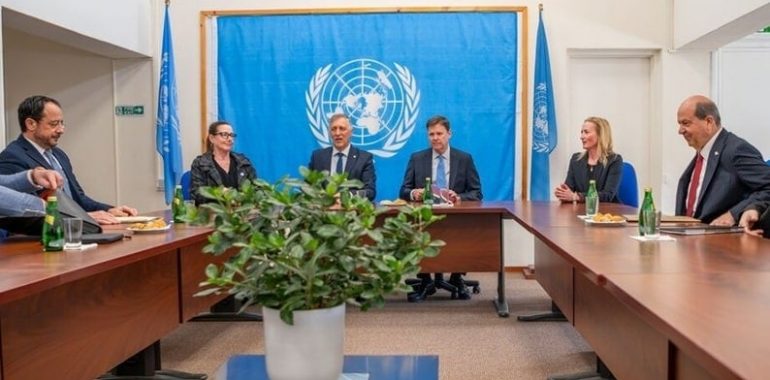Cyprus Talks Make Inroads on Confidence-Building Measures

Cyprus Talks Make Inroads on Confidence-Building Measures
Talks on implementing confidence-building measures in divided Cyprus continued on Wednesday during a meeting in Nicosia between President of Cyprus Nikos Christodoulides and Turkish Cypriot leader Ersin Tatar.
Christodoulides said the meeting was “yet another positive step” with progress including youth issues, demining and restoration of cemeteries. Progress, he said, was made on four out of six topics, while Tatar announced that they would be meeting again before April 20.
The UN issued a statement saying the leaders had agreed to establish a Technical Committee on Youth, to discuss demining, that the Technical Committee on Environment would work on initiatives related to the environment and climate change, and would continue discussions on crossing points and solar energy in the buffer zone. The Technical Committee on Cultural Heritage, meanwhile, would be tasked to work on the restoration of cemeteries.
The measures echoed those the two leaders agreed to pursue in a meeting with U.N. Secretary-General Antonio Guterres in Geneva last month that aimed to breathe new life into a peace process on hiatus for nearly eight years. Guterres said he will appoint an envoy tasked with getting formal peace talks restarted.
Christodoulides on Cyprus talks: “Positive step”
“We have positive results today,” Christodoulides said. He added that “we are pressing forward” and that “we have started implementing what we promised the [UN] secretary-general.”
The Cypriot President said the government was waiting for the announcement of the appointment of a UN envoy, “so that by the next meeting we can achieve the great aim which is no other than the resumption of talks.”
In a joint statement after the meeting, the UN said the leaders “met at their own initiative to follow up on the Geneva informal broader format meeting under the auspices of the secretary-general.”
“The two leaders agreed to establish a Technical Committee on Youth and provide by 15 April to the United Nations a list of members. They agreed that the committee would have 12 members from each side and that all would be under 35 years of age. They also endeavoured to aim for gender parity,” the UN added.
“The two leaders agreed that the issue of demining would be discussed at the level of the Greek Cypriot negotiator and the Turkish Cypriot special representative and that they would exchange information on a proportional number of suspected hazardous areas from each.”
The UN said the leaders had also agreed the Technical Committee on Environment would work on initiatives related to the environment and climate change, including the impacts on mining areas, and that the Technical Committee on Cultural Heritage would be tasked to work on the restoration of cemeteries.
It added that “on crossing points and solar energy in the buffer zone, they had a constructive exchange and the leaders tasked their representatives to continue discussions of the issues, with the view to finding a mutually acceptable resolution.”
Tatar: I have my own principles
After the meeting, Tatar said: “We are positive, we want to achieve things, and I hope in time we will be able to . . . My friend Nikos has his own principles, I have my own principles, and what is important is that we are able to have an exchange of views so that we can achieve things for both Turkish Cypriots and Greek Cypriots.”
It is important “to solve it in a reasonable manner,” he added.
Tatar and Turkey insist a two-state deal is now the only way to resolve one of the world’s most intractable disputes since the “old” model—a federation made up of Greek and Turkish speaking zones—is no longer viable after decades of failure.
Greek Cypriots say any deal that entrenches the island’s partition is a non-starter as it contravenes long-held U.N. resolutions endorsing a federation.